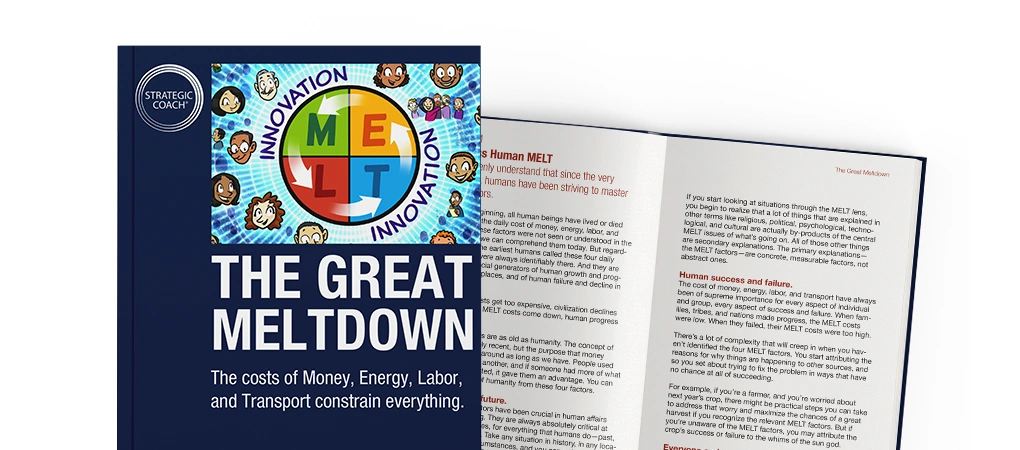What Are The Challenges Of Entrepreneurship? (And How To Overcome Them)
The Strategic Coach Team

Entrepreneurship can provide freedom, wealth, and the ability to build your ideal lifestyle. But there are also many challenges of entrepreneurship that can hinder you from achieving those goals, and even make entrepreneurship more difficult than your previous life.
Over the years, we’ll often ask our audience, “What are the challenges of entrepreneurship?” and the same answers generally come up. Here are six of the most common challenges of entrepreneurship we’ve encountered over the years and how to overcome them.
1. Teamwork and delegation.
Most people get into entrepreneurship because they have a particular skill. They then build a business around getting paid for that skill. But that isn’t really a business, is it? That is what we would consider a job.
So one of the biggest challenges of entrepreneurship is transitioning from that “job” to a “company” that runs by itself and is no longer dependent on you. And to do that, you need a team, and you need to be able to delegate to them.
We’ve found that there are two primary challenges with teamwork and entrepreneurship. The first is that entrepreneurs get hung up on how they’re going to do something, and they hit a roadblock when they don’t have the capabilities or resources to do it themselves.
The easiest way to bypass this is to utilize the simple concept of WhoNotHow. Instead of asking, “How can I do this?”, ask “Who can do this for me?”
When you first start out in entrepreneurship, you may have to do everything yourself. But if you want to scale and grow, you need to get away from that “How” mindset and adopt a “Who” mindset.
The next step is hiring good people and building a team that can help you achieve your business goals.
Our first piece of advice is to remove the word “employee” from your lexicon and replace it with “team member.” An employee is someone who holds a job, while a team member is a person working in their Unique Ability (what they love to do and do best). There is a clear difference between the two, and that’s incredibly important to understand for anyone getting into entrepreneurship.
You also need to shift your perspective when hiring. Hiring a team member is not a “cost”; it’s an investment in your company’s future. When you invest in great team members, you create team multipliers that will in turn grant you massive returns on your investment. This can be hard for people new to entrepreneurship—it may seem like a massive cost to hire a team. But what they don’t realize is that they’re getting a massive return.
Want to learn more about this common challenge of entrepreneurship? Check out our Teamwork And Delegation resources.
2. Focus and productivity.
No matter what industry you’re in or what your business model is, the key to success in entrepreneurship is staying focused on the right things on a daily basis.
When we ask our audience, “What are the challenges of entrepreneurship?”, one of the most popular answers is always focus and productivity. Many people struggle with this in entrepreneurship because they feel as if there’s so much to do in their business. They don’t feel like they’re being productive enough, or they can’t focus on one task because there are so many other challenges occupying their mind.
One simple tip is to stop trying to do a million things every day. Assign yourself three tasks to do each day (preferably, the night before) and focus only on completing those three things. Once you complete them, you’re free to either stop or keep going. Anything else you do is a bonus.
This will make everything in your business simpler and allow you to put your full focus on one challenge at a time. What we’ve found is that most people end up accomplishing more with this method because once they complete the first three items on their list, they’re energized and ready to keep going.
We’ve detailed many more strategies to combat this challenge of entrepreneurship in our blogs, podcasts, and other resources on Focus And Productivity.
3. Work-life balance issues.
The average entrepreneur works 66 hours per week, and many work far more than that. When it feels like everything relies on you, it can be difficult to step away. This is one of the most distressing challenges of entrepreneurship as it can cause burnout, affect your relationships, and even be harmful to your health.
But the reality is that working overtime doesn’t work—especially in entrepreneurship! Many people are under the assumption that working longer and harder will get them to their goals faster. That’s simply not true in entrepreneurship. What we’ve found is the more free time entrepreneurs take, the more creative they become. The more creative they become, the more successful they are in terms of revenue and profit.
Working less but being very energetic and creative while you’re working actually provides 10x greater results. Don’t believe us? Check out our Overwhelm & Work-Life Balance resources we have on this challenge. This has been proven time and time again, specifically with respect to entrepreneurship.
To put it simply, if you feel like you’re spending too much time in your business, you probably are! Remember why you embraced entrepreneurship in the first place: freedom!
4. Developing good habits and achieving goals.
There’s a reason why personal development and entrepreneurship are so intertwined. In a job, you can go about your day-to-day responsibilities, get promoted, and achieve progress. In entrepreneurship, there are a lot more challenges as there’s no set path to follow.
If you want to achieve progress in your business, you need to set goals and achieve them. Doing that is harder than it might sound! It’s one of the most common challenges of entrepreneurship.
So, with that said, here’s a quick tip from Dan Sullivan to develop good habits that will help you achieve your goals—either in entrepreneurship or any other part of your life.
When most people try to develop good habits, they look at what’s going on in their life at that moment. Instead, look toward the future. Think 5, 10, 25 years in the future and ask yourself, “What habits would I want to start today that I would still be doing 25 years from now?”
This is a good way to start new habits that you will actually keep throughout your career in entrepreneurship. If you can envision yourself doing it 25 years from now, it makes it easier to start.
But let’s take it a step further. Ask yourself, “What habits would the person I want to be a year from now have that I don’t have?” and “What habits would it be worth doing every day so that I can become more successful?”
These simple questions will expand your thinking and help you develop habits that are easy to start, realistic, and impactful for your life and business.
If you’re looking for more information on forming habits, setting goals, and finding success, check out our Goal Setting And Success Habits resources. Forming good habits is essential for overcoming the many challenges of entrepreneurship.
5. Procrastination and time management.
Many entrepreneurs struggle with time management, and one of the root causes is procrastination. When you’re forced to do everything in your business yourself, there will inevitably be activities that you dread, which will cause you to procrastinate.
What most people don’t realize, however, is that procrastination is often a sign that bigger things are on the way, especially with regards to entrepreneurship. Let’s take a look at how that works.
First, write down what you’re procrastinating about today. Then look at your list and say to yourself, “I’m not doing these things because something bigger is coming. What’s the bigger thing that’s coming?”
The reason most people procrastinate—especially in entrepreneurship—is because they’re putting their energy into activities that aren’t good for them or their business. These are activities that don’t utilize their Unique Ability and don’t challenge them.
You know, deep down, that there are bigger and better things you could be putting your energy into. Bringing those bigger and better things to the front of your mind will create a wave of insights and possibilities. You can then focus on the bigger, more important projects while letting others take care of the tasks you were dreading.
There are many other facets to time management in entrepreneurship. If you’d like to learn more about this common challenge, check out our Time Management resources.
6. Business growth and scaling.
If you were to ask any random person, “What are the challenges of entrepreneurship?” their mind would almost certainly default to growing a business.
And for the most part, they’d be right. Figuring out how to grow your business is the most obvious and daunting challenge of entrepreneurship. There are thousands of ways to grow a business, and deciding which way is best for you can feel like an impossible challenge.
At Strategic Coach, we aren’t concerned with nitty-gritty marketing tactics or “growth hacks” that are so common in the entrepreneurship space. Instead, we believe the best way to grow your business is to expand your thinking. Here’s an example of one simple exercise any entrepreneur can do to quickly understand what they should focus on to grow their business.
First, identify all the ways you’re making money in your business right now. Then, ask yourself the following four questions for each revenue stream and grade your answer on a scale of one to five:
- If you stay with this activity, can it go 10x?
- Does this activity fascinate and motivate you?
- Is this an activity that would last 25 years?
- Is this an activity that would present the possibility of constant new innovation?
Succeeding in entrepreneurship is often more about motivation, creativity, and innovation than marketing gimmicks and business models. By answering these questions, you’ll find one aspect of your business that motivates you, has the potential for growth, and that can provide constant innovation for years to come. Doubling down on that activity will be the key to long-term, consistent growth.







